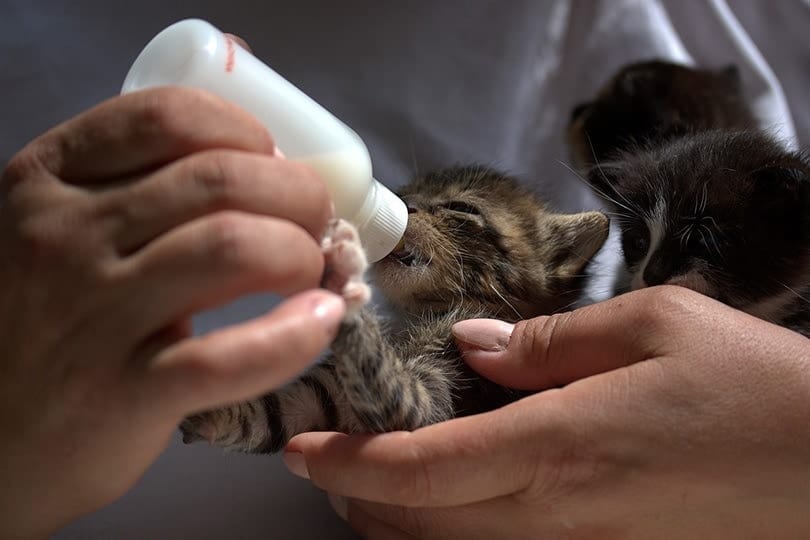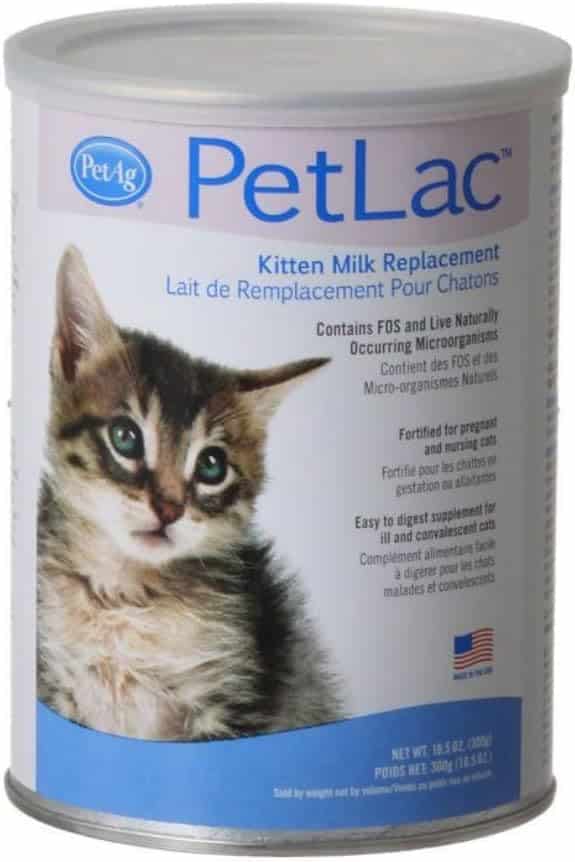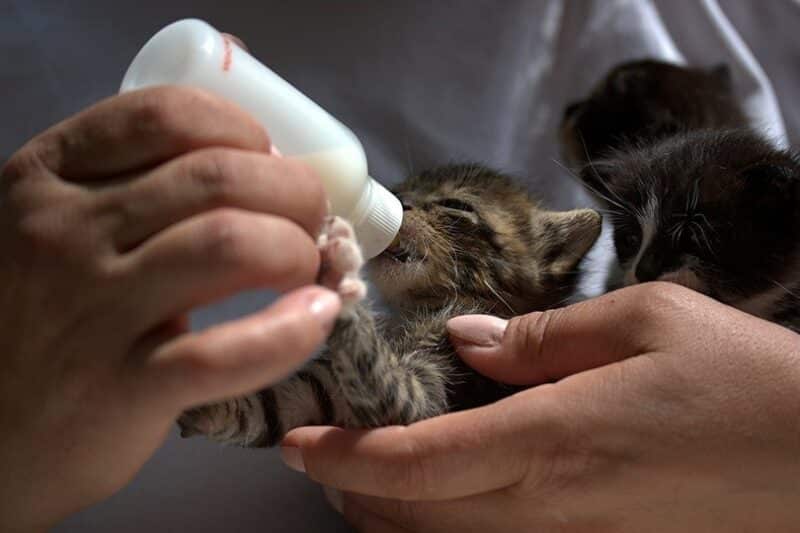
If you’re new to fostering or your current charges don’t seem to like the kitten milk replacer (also called KMR) that you’ve been using, you need to find something fast. But when you’re looking after one or more kittens, your schedule is incredibly tight. So, here are reviews of six of the best kitten meal replacers. You’ll be feeding those hungry kittens in no time!
A Quick Comparison of Our Favorites
| Image | Product | Details | ||
|---|---|---|---|---|
| Best Overall |

|
PetAg KMR Powder Milk Supplement for Kittens |
|
CHECK PRICE |
| Best Value |

|
Hartz Powdered Milk Replacer Formula for Kittens |
|
CHECK PRICE |
| Premium Choice |

|
Nutri-Vet Powder Milk Supplement for Kittens |
|
CHECK PRICE |

|
GNC Pets Ultra Mega Premium Milk Replacer for Kittens |
|
CHECK PRICE | |

|
PetAg PetLac Kitten Milk Replacement |
|
CHECK PRICE |
The 6 Best Kitten Milk Replacers
1. PetAg KMR Powder Milk Supplement for Kittens — Best Overall

| Sizes: | 6 oz., 11 oz., 12 oz., 28 oz., or 5 lbs. |
| Product form: | Liquid or powder |
| Protein: | 42% |
| Fat: | 25% |
The best overall kitten milk replacer is PetAg’s KMR Powder Milk Supplement for Kittens. There are many options: It comes in liquid form in one size (11 ounces) and powder form in five sizes (6, 11, 12, and 28 ounces and a 5-pound bag). It provides a completely nutritionally balanced meal for kittens lacking their mother’s milk, but it can also be given to seniors and stressed cats. It’s all-natural and highly digestible, provides necessary minerals and vitamins like taurine and amino acids, and is high in protein.
The main flaw with this kitten meal replacer is if you opt for the powder form, it sometimes doesn’t incorporate and dissolve well into the water.
- Comes in liquid and powder forms in different sizes
- For orphaned kittens and stressed or senior cats
- All-natural and highly digestible
- Contains necessary nutrients for growing kittens
- Powder doesn’t always consistently incorporate into the water
2. Hartz Powdered Milk Replacer Formula for Kittens — Best Value

| Size: | 11 oz. |
| Product form: | Powder |
| Protein: | 30% |
| Fat: | 40% |
The best kitten milk replacer for the money is Hartz’s Powdered Milk Replacer Formula for Kittens. It contains real milk in addition to necessary minerals and vitamins that include taurine, omegas, and antioxidants for overall health and muscle growth. It closely resembles a mother cat’s milk, so it is gentle on tummies and easily digested. It can be given to senior cats and nursing mothers too.
However, it doesn’t come with a scoop, and the container is fairly narrow, so it can be challenging to get out. Also, some kittens might get stomach upset with this product.
- Affordable
- Includes real milk, taurine, antioxidants, and omegas
- Easily digested and good for sensitive tummies
- Suitable for senior cats and nursing mothers
- Scoop is not included
- Might cause stomach upset
3. Nutri-Vet Powder Milk Supplement for Kittens — Premium Choice

| Size: | 12 oz. |
| Product form: | Powder |
| Protein: | 30% |
| Fat: | 40% |
Nutri-Vet’s Powder Milk Supplement for Kittens is our premium choice pick. It’s made with whey protein, which includes essential amino acids for overall health and growth. Nutri-Vet also offers a custom blend named Opti-Gut, which has probiotics for healthy digestion. It’s full of the right balance of fat, protein, and carbs in addition to vitamins, minerals, and amino acids.
One of the problems with this product is it is more expensive than some of the others. Also, pickier kittens don’t seem to like it.
- Made with whey protein for essential amino acids
- Opti-Gut has probiotics for healthy digestion
- Made in the U.S.A.
- Right balance of nutrients, vitamins, and minerals
- Expensive
- Some kittens don’t like it
4. GNC Pets Ultra Mega Premium Milk Replacer for Kittens

| Size: | 12 oz. |
| Product form: | Powder |
| Protein: | 42% |
| Fat: | 25% |
While GNC’s Pets Ultra Mega Premium Milk Replacer for Kittens is indeed a milk replacer, it’s actually a formula designed to wean your kitten from the bottle. It’s made with enriched skim milk, which is easily digested to make the transition to solid food easier on the stomach.
It supports the kitten’s development and growth and is high in protein. It also helps the body develop immunity. Unfortunately, some pickier kittens don’t like it, and stock may be limited.
- Designed to wean kitten from the bottle
- Made with enriched skim milk for easy digestion
- High in protein
- Helps them develop immunity
- Picky kittens don’t like it
- Limited stock may impact availability
5. PetAg PetLac Kitten Milk Replacement

| Size: | 10.5 oz. |
| Product form: | Powder |
| Protein: | 33% |
| Fat: | 18% |
PetAg’s PetLac Kitten Milk Replacement will benefit newborn kittens unable to nurse from their mothers. It’s highly digestible, contains FOS and live probiotics to aid healthy digestion, and has taurine and milk proteins essential for growing kittens. It’s also effective for nursing and for post-weaned kittens.
However, it can be difficult to mix for some cat owners, and the texture can be grainy. Additionally, it has been known to cause upset stomachs in some kittens.
- Contains FOS and live probiotics for healthy digestion
- Has taurine and milk proteins
- Suitable for nursing and post-weaned kittens
- Doesn’t always mix well
- Texture can be grainy
- Might cause stomach upset
6. Revival Animal Health Breeder’s Edge Foster Care Kitten Milk Replacer

| Size: | 12 oz. & 4.5 lbs. |
| Product form: | Powder |
| Protein: | 32% |
| Fat: | 44% |
Revival Animal Health’s Breeder’s Edge Foster Care Kitten Milk Replacer is formulated to help kittens in their first 35 days of life. It promotes a healthy gastrointestinal tract, which means it’s less likely to cause diarrhea. It contains balanced vitamins, minerals, and nutrients for boosting the immune system and helps condition the skin and coat.
But it tends to cause poop issues: Some kittens might get diarrhea and others might get constipated. The other problems are more about the seller than the product. For one thing, some cat owners receive a product with a broken seal, and others seem to receive the puppy instead of the kitten formula. If this does happen, do not give the puppy formula to your kitten. They will get an upset stomach. Stock and availability may also be limited.
- Formulated for the first 35 days of a kitten’s life
- Promotes a healthy GI tract
- Boosts the immune system
- Conditions the skin and coat
- Might cause poop issues
- Product might arrive unsealed
- Might receive the puppy formula instead

Buyer’s Guide: How to Choose the Best Kitten Milk Replacer
Before you purchase your chosen milk replacer, let’s go over a few points that can help you make the best decision for your kitten.
Liquid vs. Powdered
Liquid formula is one of the easiest to work with because you don’t have to mix or measure the right amount of water, but it does need refrigerating once opened. The liquid has a shorter shelf-life and is more expensive than the powder when you consider how much powder versus liquid is in the packaging.
You can get far more powdered formula than liquid for the same price, so it’s less expensive and has a longer shelf life. But you do need to mix it, and many powdered formulas don’t always mix well. Whether you choose liquid or powder, though, it will need to be warmed up before feeding your kitten.
Bottles
You’ll need kitten bottles and a few different types of nipples for your kitten, in addition to syringes. Your best bet is to go with a variety pack, as kittens can be rather particular about the nipple that they drink from. Some variety packs will include brushes, which will make cleaning the bottles much easier.

What You Should Look For in a Kitten Milk Replacer
Considering that kitten meal replacers are designed to replace a mother cat’s milk, there are ingredients and nutrients that you should look for:
| Protein and fat: |
To support their growing body, a kitten needs a formula high in protein and fat. It’s designed to closely resemble the fat and protein found in a mother cat’s milk.
|
| Vitamins and minerals: |
Kitten milk replacers should contain vitamins and minerals that support a growing kitten. Vitamins like E, B12, D, and A are vital, as is added calcium for growing bones.
|
| Probiotics and prebiotics: |
Probiotics and prebiotics, including FOS, are crucial for building good bacteria in the gut and contributing to a strong digestive system.
|
| Amino acids: |
These should include essential taurine, which aids development, vision, and digestion health.
|
Mixing
Whether you purchase liquid or powder formula, once it’s been opened, you’ll need to store it in the refrigerator. It should be used before the expiration date. While mixing, it should smell a bit sweet, so if it smells “off” to you, such as sharp or bitter smelling, it is likely spoiled and shouldn’t be used.
Once mixed, place the bottle in warm water to warm it up (or use a bottle warmer if you have one), and apply some of the formula on the inside of your wrist to test the temperature. It should feel comfortable and just warm, never hot.
At Catster, we’ve admired Hepper for many years and decided to take a controlling ownership interest so that we could benefit from the outstanding designs of this cool cat company!
Conclusion
PetAg’s KMR Powder Milk Supplement for Kittens is our favorite with its high protein. It’s also highly digestible and contains the important amino acid, taurine. Hartz’s Powdered Milk Replacer Formula for Kittens contains real milk, taurine, omegas, and antioxidants for overall health and muscle growth, and it’s affordable!
Finally, Nutri-Vet’s Powder Milk Supplement for Kittens is our premium-choice pick because it’s made with whey protein, which includes essential amino acids for overall health.
Our goal with these reviews is to lead you to the best kitten meal replacer for your kitten. We know how time-consuming caring for a newborn kitten can be, so hopefully, we’ve made your life a little easier.
See also:
- Why Do Cats Move Their Kittens? 3 Reasons for This Behavior
- Where Should You Buy or Adopt a Kitten? Facts & FAQ
Featured Image Credit: Adina Voicu, Pixabay
Contents
- A Quick Comparison of Our Favorites
- The 6 Best Kitten Milk Replacers
- 1. PetAg KMR Powder Milk Supplement for Kittens — Best Overall
- 2. Hartz Powdered Milk Replacer Formula for Kittens — Best Value
- 3. Nutri-Vet Powder Milk Supplement for Kittens — Premium Choice
- 4. GNC Pets Ultra Mega Premium Milk Replacer for Kittens
- 5. PetAg PetLac Kitten Milk Replacement
- 6. Revival Animal Health Breeder’s Edge Foster Care Kitten Milk Replacer
- Buyer’s Guide: How to Choose the Best Kitten Milk Replacer
- Conclusion















